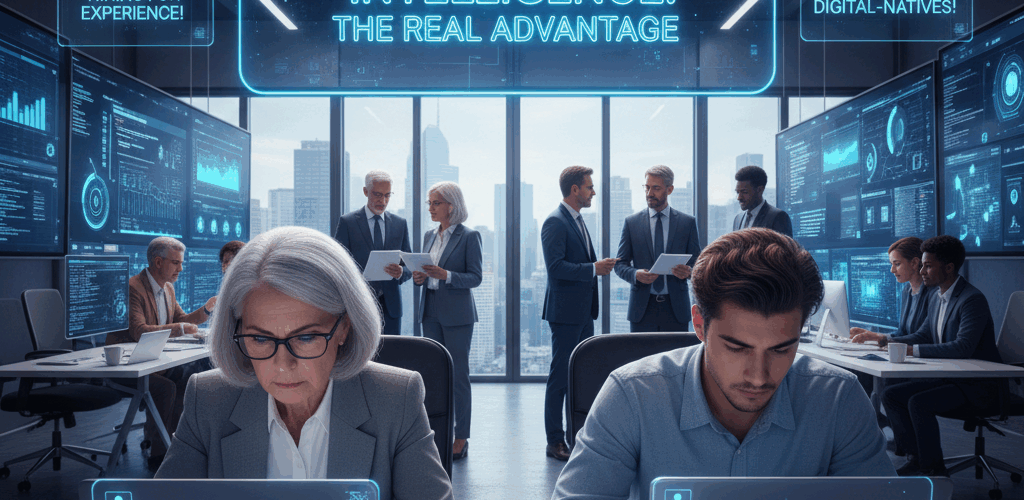EN
DE
NL
When experience becomes a liability instead of an asset, the system—not the individual—is broken.
The silent discrimination nobody likes to name
Let’s be honest: ageism in the digital world is real.
I’ve heard it more than once — “You’re too old to understand AI,” or “We’re looking for someone who’s more digital-native.”
Funny enough, these comments often come from people who still struggle with version control in SharePoint or think that “innovation” means buying a new SaaS tool.
At 61, I’m not “too old” for technology.
I’m just too experienced to believe that technology alone will fix cultural, structural, and human problems.
The paradox of digital transformation
We live in a paradox.
- Companies say they want experience — but hire for youth.
- They promote diversity — but silently exclude by age.
- They talk about lifelong learning — but don’t fund it beyond 40.
Meanwhile, we keep reading about the “shortage of skilled professionals” while many of us — skilled, updated, and curious — get filtered out by ATS algorithms designed to detect the wrong signals.
The truth?
We’ve built systems that confuse freshness with competence and speed with clarity.
I’ve lived through more than one transformation
I started my career long before “digitalization” became a buzzword. I’ve seen the rise of the internet, social media, mobile, and now AI. Each wave came with the same pattern: excitement, denial, hype, and then the slow realization that success depends not on technology but on human adaptation.
That’s the part I understand deeply — and what many “digital natives” still need to learn.
Technology amplifies human potential, but it doesn’t replace empathy, curiosity, or leadership. Those aren’t soft skills. They are strategic survival skills.
Learning goes both ways
I often attend tech and AI meetups here in Berlin. Usually, I’m the oldest person in the room — sometimes by decades. But that has never been a hurdle.
Quite the opposite: it’s an advantage.
Younger people bring new energy, new tools, and a different way of looking at the world. I bring experience, pattern recognition, and a sense of context — the “why” behind the “what.” When these perspectives meet, something remarkable happens:
Innovation becomes intergenerational.
The best conversations I’ve had weren’t about which model version is newest, but about why we build what we build — how it changes how people live, work, and connect.
That’s where transformation truly begins — not in the latest framework, but in shared understanding across generations.
Why this matters right now
A recent report (Fortune, Criteria) shows that 92% of Gen Z applicants are rejected because they lack the very skills companies need most: communication, collaboration, and professionalism. (https://fortune.com/2025/10/07/hiring-managers-gen-z-ready-for-work-careers-jobs-unemployment-ai-skills-based-us-college-degree-crisis/)
So here’s the irony:
While companies underestimate older professionals because of our age, they also reject younger professionals because of their lack of experience.
In other words, the system filters out both ends of the talent spectrum — and then complains about a talent shortage.
We don’t have a generation problem. We have a context problem.
Every generation is shaped by its context:
- Gen X learned resilience and adaptation.
- Millennials mastered multitasking and digital collaboration.
- Gen Z brings creativity, activism, and fast learning.
But instead of connecting these strengths, organizations isolate them through stereotypes.
That’s why transformation fails — not because of AI or digitalization, but because we keep fragmenting the human side of work.
My message to employers and leaders
If you’re serious about innovation, stop hiring for “years of birth” and start hiring for curiosity, clarity, and courage.
Look beyond the résumé filters.
The future workforce isn’t defined by age — it’s defined by attitude.
I’m not competing with a 25-year-old. I’m collaborating with them. Because the real competitive advantage is intergenerational intelligence — learning from each other instead of labeling each other.
In closing
At 61, I’m not done learning. I’m just done pretending that digital transformation is about tools and dashboards. It’s about people — and about the will to evolve.
So, if being “too old” means I understand that innovation without empathy is just automation— then yes, I’ll wear that badge proudly.
One my other page https://futureorg.digital/, I focus on human based transformation and the need of a fitting culture. And as an additional proof of concept, you can gladly visit my page with my certificates about innovation, digitalisation and AI https://curriculum-vitae.digital/
As we say in the Netherlands: “Hoe meer je weet, hoe meer weet je dat je niets weet.”
The older I get, the more I see that wisdom isn’t about knowing everything — it’s about staying curious enough to keep learning.
AI didn’t break the job market on its own — we did, by letting convenience replace connection.The fix isn’t another tool. It’s a mindset shift: from data-driven exclusion to human-centered inclusion.
Until we make that shift, the “AI black hole” will keep swallowing talent — and with it, our sense of fairness, purpose, and trust.
